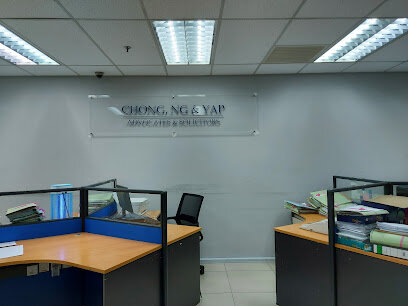Best Renewable & Alternative Energy Lawyers in Petaling Jaya
Share your needs with us, get contacted by law firms.
Free. Takes 2 min.
List of the best lawyers in Petaling Jaya, Malaysia
About Renewable & Alternative Energy Law in Petaling Jaya, Malaysia
Renewable and alternative energy law in Petaling Jaya, Malaysia, governs the development, implementation, and regulation of environmentally friendly energy sources such as solar, wind, biomass, and hydropower. The region is experiencing growing interest in clean energy solutions as a response to rising energy demands and environmental concerns. The legal framework ensures that these energy projects align with national and local policies, support sustainable growth, and minimize environmental impact. Businesses and individuals involved in the sector must navigate a range of regulations related to licensing, environmental approvals, incentives, and safety standards.
Why You May Need a Lawyer
Legal advice is essential when navigating the complexities of renewable and alternative energy in Petaling Jaya. Here are some common scenarios where legal assistance may be necessary:
- Applying for permits or licenses to start an energy project
- Negotiating power purchase agreements or joint venture contracts
- Ensuring compliance with environmental and safety standards
- Securing government incentives and tax benefits
- Handling disputes regarding land use or intellectual property
- Addressing zoning and building code issues
- Acquiring or leasing land for energy installations
- Dealing with cross-border energy supply agreements
A lawyer can help clarify obligations, mitigate risks, ensure regulatory compliance, and represent your interests in transactions or disputes.
Local Laws Overview
Renewable and alternative energy in Petaling Jaya is primarily influenced by a combination of national and local regulations. Key aspects include:
- Renewable Energy Act 2011 - Lays the foundation for the development and promotion of renewable energy, including feed-in tariffs, incentives, and regulatory measures.
- Sustainable Energy Development Authority (SEDA) - The body responsible for implementing and managing sustainable energy programs and licensing in Malaysia.
- Environmental Quality Act 1974 - Sets environmental standards, including requirements for Environmental Impact Assessments for significant energy projects.
- Planning and Zoning Regulations - Local municipal councils, such as Petaling Jaya City Council (MBPJ), oversee approvals for land use, building permits, and community guidelines.
- Power Purchase Agreements (PPAs) - Legal contracts governing the sale and purchase of renewable energy to grid operators, regulated by the Energy Commission.
- Tax Incentives and Grants - Additional regulations exist for claiming tax deductions and obtaining government grants for renewable energy investments.
Understanding these regulations is crucial for ensuring smooth operations and compliance when pursuing renewable and alternative energy projects in Petaling Jaya.
Frequently Asked Questions
What types of renewable energy are common in Petaling Jaya?
The most common renewable energies in Petaling Jaya are solar power, biogas, and small-scale hydropower. Solar rooftop installations are especially popular for residential and commercial properties.
Do I need a license to install solar panels at my home or business?
Residential installations typically do not require a license for self-consumption, but permits and approvals may be needed if you plan to sell electricity back to the grid or undertake larger installations.
What government incentives are available for investing in renewable energy?
Incentives include feed-in tariffs under the Feed-in Tariff (FiT) scheme, tax deductions, grants, and capital allowances. These aim to make investments more financially attractive for individuals and businesses.
Is an Environmental Impact Assessment (EIA) always required?
An EIA is required for large-scale renewable energy projects, particularly those that may have significant environmental impact. Small residential or commercial installations generally do not need an EIA.
Can foreign investors participate in renewable energy projects?
Foreign investors can invest, but are subject to national ownership, licensing, and regulatory requirements. Legal advice can help clarify specific investment pathways and partnership structures.
What are the common legal risks in renewable energy projects?
Risks include regulatory changes, failure to obtain proper permits, breach of contract, environmental liability, and disputes over land use or intellectual property rights.
How are disputes related to renewable energy resolved?
Disputes may be handled through negotiation, mediation, arbitration, or litigation. The preferred method often depends on the terms set out in contracts and relevant laws.
Can homeowners associations stop the installation of solar panels?
Homeowners associations may set community guidelines that restrict external modifications to properties, including solar panels. Legal review of association bylaws is advised before installation.
How long does it take to obtain permits for a renewable energy project?
The timeline varies depending on the size, type, and location of the project, as well as the efficiency of the relevant authorities. Small installations can take a few weeks, while large projects may require several months.
What penalties apply for non-compliance with energy or environmental laws?
Penalties can range from fines and suspension of licenses to orders for project cessation and criminal charges for serious breaches. Adhering to all regulatory requirements is essential to avoid legal consequences.
Additional Resources
There are several organizations and bodies that provide information, support, and oversight for renewable and alternative energy in Petaling Jaya and Malaysia:
- Ministry of Energy and Natural Resources (KeTSA)
- Sustainable Energy Development Authority Malaysia (SEDA)
- Energy Commission (Suruhanjaya Tenaga)
- Malaysian Investment Development Authority (MIDA)
- Petaling Jaya City Council (MBPJ) for local planning permissions
- Malaysian Photovoltaic Industry Association (MPIA)
- Non-governmental organizations focused on environmental advocacy
Contacting these bodies can help clarify regulatory requirements and opportunities for support in renewable energy projects.
Next Steps
If you are considering a renewable or alternative energy project or have legal concerns in Petaling Jaya, here are the recommended steps:
- Identify the type and scale of your project or legal issue
- Gather all relevant documents, including land titles, technical plans, and business details
- Consult with a qualified lawyer experienced in renewable and alternative energy law
- Contact the appropriate governmental or regulatory bodies for updated information on requirements
- Review eligibility for incentives or assistance programs
- Ensure continuing compliance with all local and national laws throughout your project
Engaging with a legal professional from the early stages can help avoid pitfalls, smooth the approval process, and protect your interests throughout the life of your renewable or alternative energy endeavor in Petaling Jaya.
Lawzana helps you find the best lawyers and law firms in Petaling Jaya through a curated and pre-screened list of qualified legal professionals. Our platform offers rankings and detailed profiles of attorneys and law firms, allowing you to compare based on practice areas, including Renewable & Alternative Energy, experience, and client feedback.
Each profile includes a description of the firm's areas of practice, client reviews, team members and partners, year of establishment, spoken languages, office locations, contact information, social media presence, and any published articles or resources. Most firms on our platform speak English and are experienced in both local and international legal matters.
Get a quote from top-rated law firms in Petaling Jaya, Malaysia — quickly, securely, and without unnecessary hassle.
Disclaimer:
The information provided on this page is for general informational purposes only and does not constitute legal advice. While we strive to ensure the accuracy and relevance of the content, legal information may change over time, and interpretations of the law can vary. You should always consult with a qualified legal professional for advice specific to your situation.
We disclaim all liability for actions taken or not taken based on the content of this page. If you believe any information is incorrect or outdated, please contact us, and we will review and update it where appropriate.













